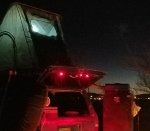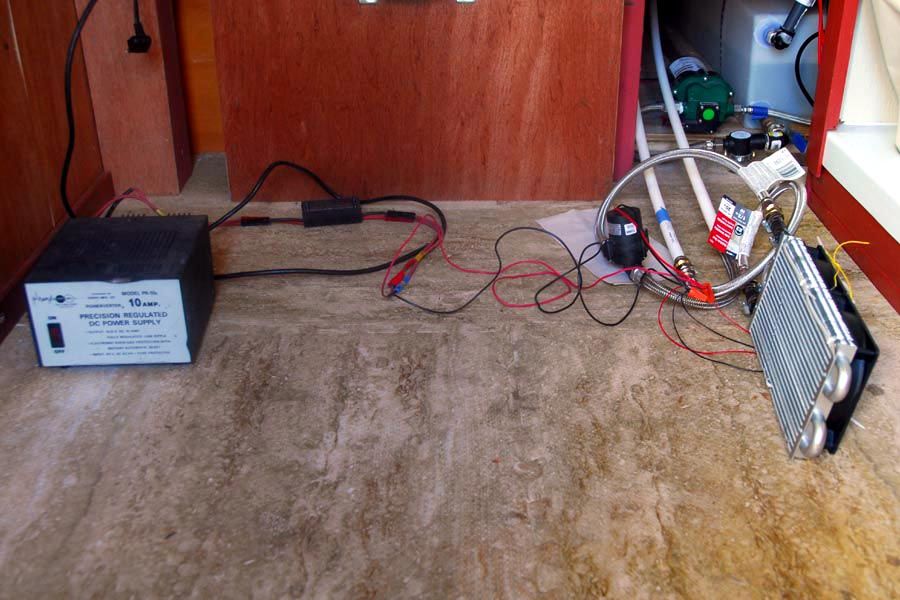llamalander
Well-known member
I have been impressed with the mattress heater while fall camping in the back of my truck.
Mine is pinned to a mattress topper, under a sheet and a large down comforter. It's powered from a 95AH house battery that is only recharged with the alternator right now. Apart from turning it on, no set-up or takedown is required and I don't notice it in the bed, which is a big plus.
My shell is un-insulated, but probably not as big as a RTT with about 3 1/2' of headroom & a fair amount of glass.
Sometimes I have turned the pad on fairly low (2 or 3 out of 7) while driving, other times I've forgotten and run it off the house battery, but either way I'v ended up unplugging it within a few hours because i'm too warm.
While I think it is rated at around 75w an hour, I suspect it uses less on the lower settings, but I have no measurements. I could have it on all night with my little battery and recoup the power driving the next day. If I could do that with solar, all the better, but in winter i'm driving between where I camp and play. If not I would count on the small generator I have, but that has never been required-
I have only been out in high 20 deg weather so far, but I'm actually interested in using the setup for winter camping once I can find a system to reliably dry my gear at the end of each day. While I have woken to frozen condensation on the inside of the windows, the cold air is not really a bother if the bed is warm.
Having good sleeping gear means a little supplemental warmth can go a long way. Being equipped to sleep with no heat source seems like the only way to pack, even a mylar blanket can make a big difference if your pad is well insulated and the wind is off of you. Starting from there, using a battery to provide a small but noticeable amount of heat doesn't seem inefficient.
Basically, while electric resistance heating is not in the same league as gas-powered, it is still worth seeing if you can meet your comfort requirements with it. If you already have a dual-battery setup the mattress warmer seems like a good way to get more out of that investment.
Mine is pinned to a mattress topper, under a sheet and a large down comforter. It's powered from a 95AH house battery that is only recharged with the alternator right now. Apart from turning it on, no set-up or takedown is required and I don't notice it in the bed, which is a big plus.
My shell is un-insulated, but probably not as big as a RTT with about 3 1/2' of headroom & a fair amount of glass.
Sometimes I have turned the pad on fairly low (2 or 3 out of 7) while driving, other times I've forgotten and run it off the house battery, but either way I'v ended up unplugging it within a few hours because i'm too warm.
While I think it is rated at around 75w an hour, I suspect it uses less on the lower settings, but I have no measurements. I could have it on all night with my little battery and recoup the power driving the next day. If I could do that with solar, all the better, but in winter i'm driving between where I camp and play. If not I would count on the small generator I have, but that has never been required-
I have only been out in high 20 deg weather so far, but I'm actually interested in using the setup for winter camping once I can find a system to reliably dry my gear at the end of each day. While I have woken to frozen condensation on the inside of the windows, the cold air is not really a bother if the bed is warm.
Having good sleeping gear means a little supplemental warmth can go a long way. Being equipped to sleep with no heat source seems like the only way to pack, even a mylar blanket can make a big difference if your pad is well insulated and the wind is off of you. Starting from there, using a battery to provide a small but noticeable amount of heat doesn't seem inefficient.
Basically, while electric resistance heating is not in the same league as gas-powered, it is still worth seeing if you can meet your comfort requirements with it. If you already have a dual-battery setup the mattress warmer seems like a good way to get more out of that investment.
Last edited:


